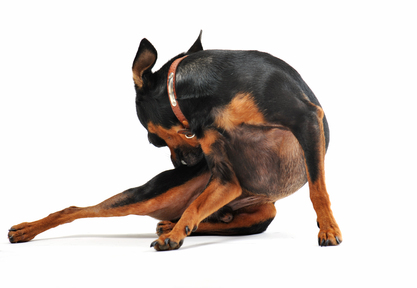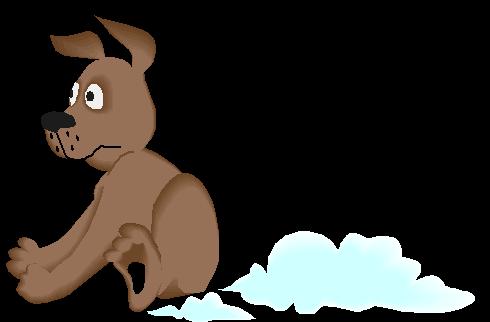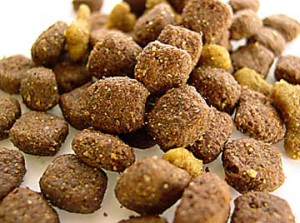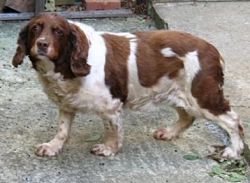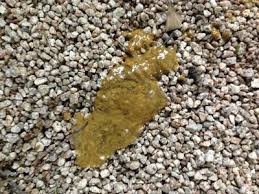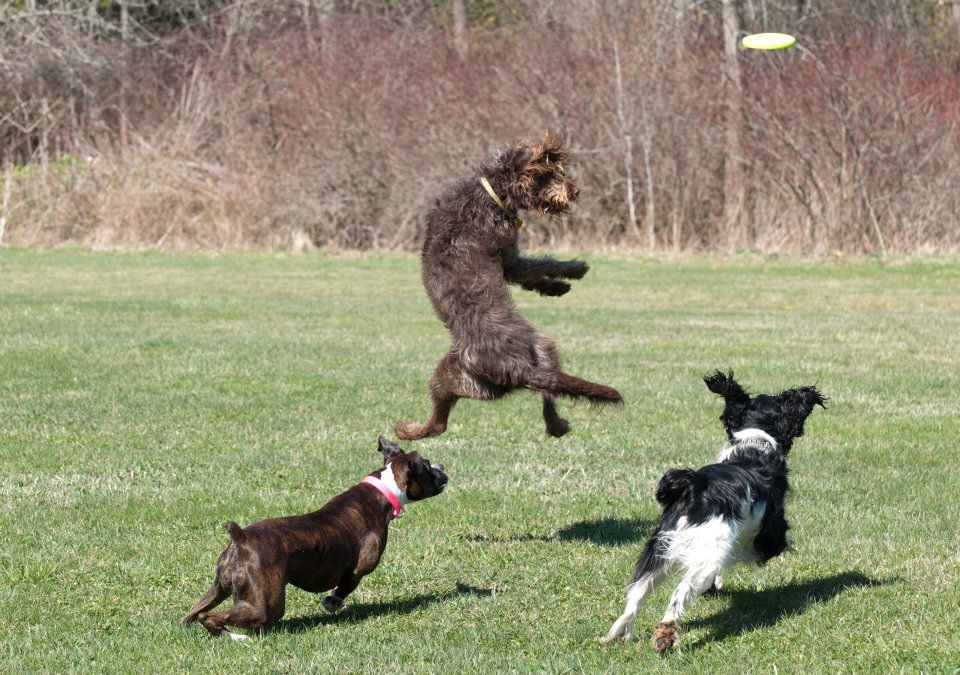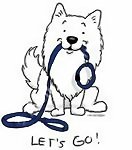Understanding Dog Anal Gland Problems
To understand dog anal gland problems you first need to know what anal glands are and why dogs have them. Then you can figure out why your dog has an anal gland problem and what you can do about it.
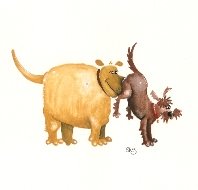 Making Friends
Making FriendsWhat Are Dog Anal Glands?
Dog anal glands are little sacs that sit inside your dog's bum at the 8 o'clock and 4 o'clock positions. These little sacs contain fluid. Every time your dog poops he empties out a little bit of this really stinky, smelly fluid from the anal sacs. We think that stuff smells horrible, but your dog thinks it smells wonderful. Go figure!
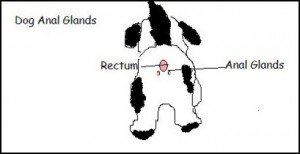
It's really important for your dog's mental and physical welfare to have anal glands that are healthy and functioning normally. Your dog's anal glands have two functions. Here's what they do.
Why Dogs Have Anal Glands?
- Anal fluid helps your dog talk to other dogs. He uses this smelly anal fluid to
mark his territory. This brown, musky fluid contains ' pheromones ', the chemicals that attract one dog to another dog.
- Anal sacs contain fluid that provides storage for toxic waste substances. The body needs to get rid of this toxic fluid regularly. This automatic elimination of anal fluid is one way your dog can keep his body clean every time he poops. Healthy dog anal glands are part of your dog's natural canine detox system. Think of it as taking out the trash!
4 Main Anal Gland Problems
- anal glands become inflamed because they get too full and don't empty often enough.
- anal glands can't empty on their own because the muscles get flaccid, loose or lazy from being ' expressed ' too often.
- anal glands can abscess, rupture and break open because the opening duct is obstructed
- a tumor causing obstruction of the opening duct.
Expressing Your Dog's Anal Glands
Yes or No?
Wild dogs don't go around expressing each
others anal glands. Let the glands work on their own.
However, if your dog has an underlying problem causing the anal sacs to become infected, clogged, impacted or abscessed, expressing anal glands is a temporary way to relieve or prevent pain, pressure or rupture.
Expressing anal glands is not a solution though, and should never be done on a regular basis because it may cause soft tissue damage making the muscle tissue loose.
Signs Your Dog Might Have an Anal Gland Problem
Watch your dog for these signs.
- ' scooting '
- dragging his bum along the ground
- licking his rear end obsessively
- the anal area looks red and swollen
- the anal area is painful if touched
If you see any of these signs, there's a pretty good chance your dog's anal glands are causing discomfort.
So What Causes
Dog Anal Gland Problems?
Poor Diet - processed diets should be avoided as much as possible. This is common knowledge. Kibble and canned dog food diets produce large, soft stools. The fiber source in these dog foods comes mostly from vegetable/grain sources. Processed food is always highly toxic putting a heavy load on the liver to detox.
Soft Stools - are the end result of improper diet. Soft stool does not push hard enough against the anal gland
wall. Therefore, not enough anal fluid is naturally expressed with the
bowel movement. Your dog will have a hard time emptying his anal glands if the stool is too soft.
Toxicity - excessive exposure to environmental pollutants such as household cleaners and 2nd hand smoke, poor food ingredients such as grains and starches, mold, drug residues, medications, parasite and microorganism die off such as candida yeast and giardia and vaccines increases your dogs toxic load.
Lack of exercise - your dog needs opportunities to have a bowel movement frequently and regularly so he can pass anal fluid. Infrequent bowel movements cause dog constipation making it hard for your dog to poop. Dog diarrhea is also one of the main causes of anal gland problems in dogs. So it's move it, or lose it! Exercise builds strong abdominal muscles, back muscles and buttocks.
Obesity - if your dog is overweight due to improper diet or lack of adequate exercise, he very likely will have poor muscle tone generally. Strong buttock and rectal muscles make defecation easier so more anal fluid will be excreted. Fat dogs are not funny. Fat dogs are unhealthy dogs!
Spinal injuries - if your dog is a jumper, or a ball or frisbee chasing nutcase like our Teddy, be careful he doesn't hurt his lower back area, his lumbar spine. Even well exercised dogs can still have anal gland problems. Pain in the lower back causes muscles to tighten, cutting off nerve flow to the anal gland area. Less sprinting, retrieving and jumping are a good thing. More walking and loping runs please!
Solutions for
Dog Anal Gland Problems
Proper feeding - your dog's digestive system requires exercise and oxygen to help keep food moving along inside the digestive tract. Feeding dogs properly does not have to be inconvenient, difficult or expensive. A diet that is correct for the carnivore species, ensures that your dog's digestive system is getting the right food to keep it running smoothly.
Bones - a raw food diet containing natural bone, is the obvious solution here. Dogs as carnivores, are meant to get their fiber mostly from bone. Bone fiber will produce smaller, firmer stools that will put pressure against the wall of the colon forcing the anal glands to excrete some fluid. You can give your dog a couple of chicken backs, turkey necks or long beef rib bones a few times a week. This is inexpensive food that provides natural fiber for dogs. It is easily obtainable at the grocery store.
Exercise - it goes without saying that the benefits of exercise for people and dogs is well documented. Take your dog for a walk. It's good for you, and it's good for him. Walking helps your dog build strong buttocks, rectal and
abdominal muscles. Exercise provides more opportunity to have a bowel movement lessening the chance of clogged or impacted anal glands. Exercise helps to prompt peristalsis increasing the
urge to have a bowel movement. thus reducing dog anal gland problems.
New! Comments
Have your say about what you've just read here. Use the comments box below.
Sharing is appreciated!
